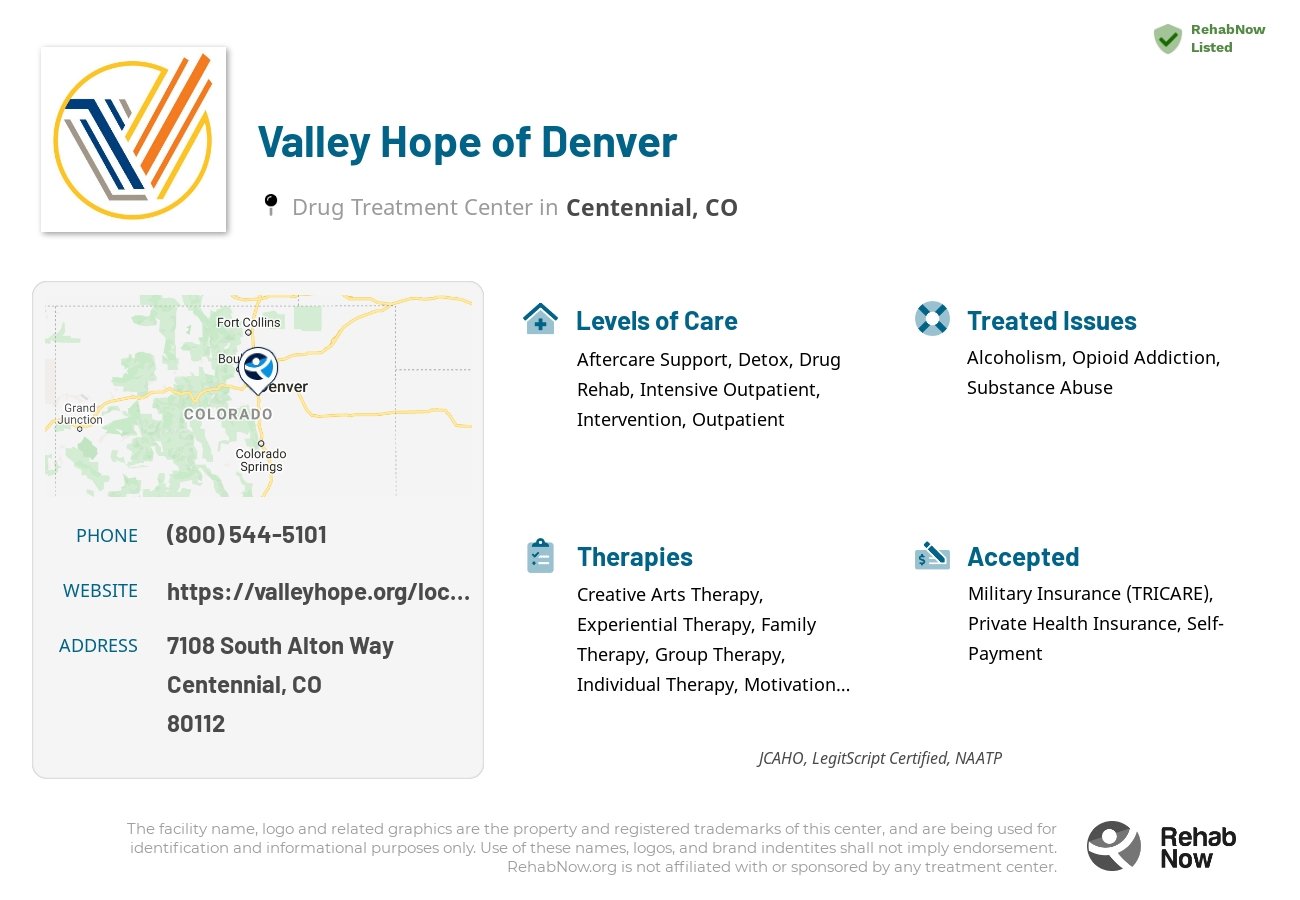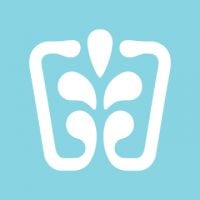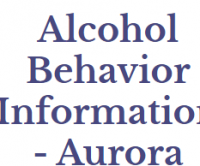Valley Hope of Denver
Drug Rehab Center in Centennial, Colorado
Valley Hope of Denver is an accredited addiction treatment facility that offers various levels of care to individuals struggling with substance abuse and addiction, accepts private health insurance, and is dedicated to providing compassionate and effective care to help individuals achieve and maintain sobriety.
About This Colorado Facility
Valley Hope of Denver, located in Centennial, CO, is strategically placed off I-25 and near light rail stations, focusing on intensive outpatient treatment for addiction. It's distinguished by its 40-bed capacity and the provision of comprehensive recovery support, including individual counseling and online treatment options. Valley Hope emphasizes life-changing care tailored to the unique needs of individuals and their families.
This esteemed facility holds accreditations from NAATP, JCAHO, LegitScript, SAMHSA, and the State License, marking its high standards in addiction care. Valley Hope of Denver sets itself apart with a wide array of services aimed at facilitating long-term recovery and addressing the complexities of addiction through evidence-based therapies and expert care.
- Individualized Treatment Plans: Tailors recovery programs to meet the specific needs of each patient.
- Comprehensive Family Care: Offers support and counseling to family members, understanding their crucial role in recovery.
- Lifelong Recovery Support: Provides continuing care and resources to assist patients in maintaining sobriety after leaving the facility.
Valley Hope of Denver treats addictions to alcohol, opioids, and other substances through a variety of methods, including detoxification and inpatient and outpatient programs. The focus is on employing evidence-based therapies and multiple levels of care to ensure each patient receives the support necessary for lasting recovery.
Genders
Ages
Modality
Additional
Accreditations
State License
SAMHSA
NAATP

LegitScript

JCAHO
Conditions and Issues Treated
Substance Abuse Treatment is important when getting sober, as it helps addicts learn the skills they need to live a clean life. There are many different kinds of recovery treatment, including medication-assisted therapy, behavioral therapeutic approaches and self-help groups, as well as counseling.
Opioid abuse has become a national epidemic in the last decade. The US has one of the world’s highest rates of opioid use and abuse, as well as opioid-related deaths. Opioids are classified as Schedule II-IV controlled substances in the US due to their high potential for abuse.
Oxycodone, hydrocodone, methadone, and fentanyl are the most common Opioids and are commonly prescribed to treat pain. Tolerance to opioids develops over time, making life difficult, if not impossible, without them. Opioid users often obtain the drugs illegally. They can be drug dealers, friends, or family members who do not have valid prescriptions.
The desire for a more intense high than prescription opioids can quickly lead to heroin use. Heroin users are more prone to illness and death due to the high risk of overdose.
Many opioid addicts who seek treatment believe that the only way to overcome their addiction is through medical detox and long-term drug addiction rehab. To help patients wean off their addiction and reduce the risk of overdose, medication-assisted therapy (MAT) involves prescribing a replacement opioid. Doctors use MAT in conjunction with other anti-craving medications to help patients maintain recovery. Due to the high risk of relapse, MAT is often combined with individual and group counseling and social support programs.
Levels of Care Offered at Valley Hope of Denver
This center offers a variety of custom treatment tailored to individual recovery. Currently available are Aftercare Support, Detox, Drug Rehab, Intensive Outpatient, Intervention, Outpatient, with additional therapies available as listed below.
The detoxification process typically includes some combination of the following: medical supervision, medication to help alleviate withdrawal symptoms, drug testing to monitor progress, and counseling.
Tackling the physical symptoms of withdrawal is essential to ensure that an individual can focus on the psychological aspects of the addiction without focusing on the physical pain that comes with withdrawal.
Withdrawal symptoms can be uncomfortable, even life-threatening, so carefully managing the detox process is extremely important. In many cases, more advanced pharmaceutical interventions are used to treat more severe withdrawal symptoms. Medication might help alleviate discomfort associated with detox, including nausea and headaches.
Intensive outpatient treatment is a form of addiction care that allows patients to continue living at home while undergoing treatment. This type of care is appropriate for patients who have been treated in residential treatment programs. Intensive outpatient programs include regular visits to the facility providing therapy, and patients gradually return to their routine life. IOP benefits most when patients have a supportive family member or friend to help them recover.
The first step to getting into an intensive outpatient program is to attend a detoxification facility. Detoxification facilities are designed to remove substances from the body safely. The patient will attend sessions designed to help them understand their addiction and its impact on their lives. While in an intensive outpatient program, therapy sessions are scheduled three to five times per week, with the patient attending no more than two sessions in one day.
An outpatient treatment program is set up to help with alcohol or drug addiction or a co-occurring disorder. The patient must attend the facility for their therapy and other programs but can return home each night.
The frequency of mandatory attendance decreases after much of Valley Hope of Denver‘s program is complete.
Outpatient treatment is a recovery approach that allows recovering addicts to live at home while getting rehab for addiction
An outpatient can include day treatments which include attending group sessions one hour per week. A person living in an outpatient environment may be allowed the opportunity to work full time if they choose to and continue studies without interruption from drugs/alcohol.
Outpatient treatment is an option for people who want to maintain their careers and families. Outpatients live at home but attend treatment such as individual counseling, group counseling, or twelve-step meetings during the day.
Interventionism is a technique used to help an addict get clean and sober. The process begins with the addict’s family, friends, and co-workers gathering together to confront the addict about their addiction. This kind of treatment aims to get the addict in touch with their feelings about their addiction. They are encouraged to speak honestly about their drug use, as well as how it’s making them feel. Most addicts come to understand that their loved ones are only trying to help them.
Aftercare support is vital to the success of someone in drug or alcohol treatment. It involves assisting with entering a sober living home, getting career counseling or educational assistance and even getting the individual lined up with programs like AA and NA. This support helps recovering addicts readjust to normal day-to-day activities and maintain sobriety.
When a person is in drug or alcohol treatment, they have to increase their focus on themselves. They need to learn how to recognize the triggers that cause them to relapse and learn the habits that would benefit them if they were to be sober. This is all part of the growth in recovery, and aftercare is essential to that process.
Therapies & Programs
At Valley Hope of Denver , to learn from past mistakes and improve one’s situation, the recovering person meets individually with a therapist. The counselor or therapist will address addiction causes, triggers, mental issues, dual diagnosis, and aftercare plans during this time. This is a very intense and challenging process. Some clients find it easier to open up to someone other than family or friends who understand their struggles with addiction.
Family therapy is a crucial part of drug treatment and getting sober. It is one of the most effective ways to help addicts stay on the path to long-term sobriety. An addict’s family can play a vital part in helping them to avoid relapse. They can spot the warning signs and help them get back on track.
In group therapy, recovering addicts meet with a therapist and other people in recovery. Some groups are closed, meaning only people who share the same addiction or problem can attend. Others are open to anyone who wants to stop using drugs or drinking alcohol. Group therapy sessions typically focus on one topic each week or month so that recovering addicts can discuss issues they face daily.
Cognitive Behavioral Therapy (CBT) is based on the idea that how we feel, think and act all interact together. It helps people explore their thoughts for problems (or false beliefs) that influence their mood and actions. CBT is very goal-oriented, which means that the therapist and patient work together on a specific problem. In addition to helping a client focus on thoughts that can be changed, CBT also allows them to take an active role in their treatment. Our thoughts determine our feelings and behaviors; our feelings affect our thoughts, and our behaviors change our thoughts and feelings.
Patient Experience
Creative Arts
Creative arts therapy is an expressive process that helps people in recovery explore feelings and emotions. While the goal isn’t always to create a final product, it’s therapeutic for many patients. They can express themselves by journaling or other forms of creative expression. Activities include sketching, painting, sculpting, etcetera. All help them handle stress and anxiety better than before their addiction (and even when they were). The activity improves communication skills and the ability to process traumatic events from one’s past, often triggered during periods of withdrawal/relapse. This benefit makes this form of treatment popular among addicts who don’t want prescription drugs but need something more substantial than talk sessions with counselors.
Experiential Therapy at Valley Hope of Denver
Experiential Therapy is a different way of thinking about addiction treatment. It uses physical activities to help work through troubling emotions, memories, and trauma that are sources of psychological issues like addiction.
Experiential Therapy can be an effective option for those who have struggled with past traumas or challenges associated with life decisions such as drug use. The non-traditional approach helps people deal more effectively with these struggles. It also allows them to gain new perspectives on their behavior patterns by recreating experiences in healthy ways rather than continuing old habits that may no longer serve them.
Payment Options Accepted
For specific insurance or payment methods please contact us.
Is your insurance accepted?
Ask an expert, call (888) 674-0062
Valley Hope Associated Centers
Discover treatment facilities under the same provider.
- Valley Hope of Denver in Englewood, CO
- Valley Hope of Parker in Parker, CO
- Valley Hope of Parker in Parker, CO
Learn More About Valley Hope Centers
Additional Details
Specifics, location, and helpful extra information.
Centennial, Colorado 80112 Phone Number(800) 544-5101 Meta DetailsUpdated April 15, 2024
Staff Verified
Is Valley Hope of Denver a LegitScript Verified Treatment Facility?
According to our most recent records, we have found this center to be LegitScript verified.
Patient Reviews
There are no reviews yet. Be the first one to write one.
Centennial, Colorado Addiction Information
The Centennial State has slipped to a ranking of 12th in the country for drug abuse. Each year around 24% of the state's population uses illegal drugs while nearly 5% of its population abuses alcohol. Substance-related deaths in Colorado were responsible for 15.12% between 2008 and 2017. Fortunately, Colorado drug and alcohol addiction treatment are available to help a person overcome addiction.
The drug addiction situation in Centennial, Colorado, is quite serious. According to the National Institute on Drug Abuse, in 2014, 9.4 percent of people in Centennial reported using an illicit drug in the past month. From 2016 to 2017, the number of heroin overdose deaths in the area doubled. A few different types of drug treatment centers are available in Centennial. Some facilities offer inpatient treatment, while other facilities offer outpatient treatment.
Treatment in Nearby Cities
- La Jara, CO (170.3 mi.)
- Crested Butte, CO (123.3 mi.)
- Boulder, CO (36.1 mi.)
- Castle Rock, CO (15.0 mi.)
- Ignacio, CO (227.0 mi.)
Centers near Valley Hope of Denver
The facility name, logo and brand are the property and registered trademarks of Valley Hope of Denver, and are being used for identification and informational purposes only. Use of these names, logos and brands shall not imply endorsement. RehabNow.org is not affiliated with or sponsored by Valley Hope of Denver.













